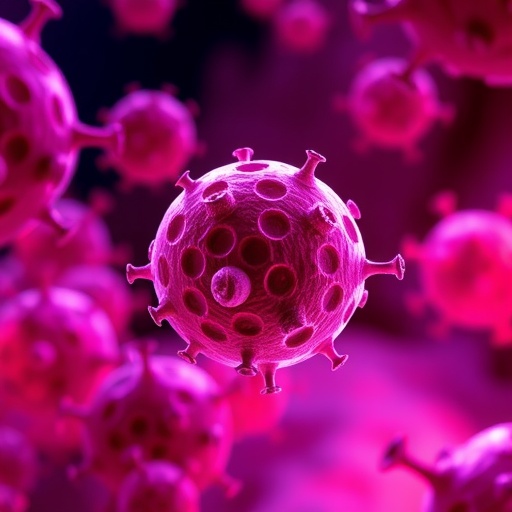In a landmark advancement for oncology, a collaborative research team from the Medical University of Vienna, the HUN-REN Research Centre for Natural Sciences, and Eötvös Loránd University in Budapest has engineered a powerful new chemotherapeutic agent named LiPyDau. This breakthrough compound demonstrates unparalleled efficacy against a spectrum of tumor types, as evidenced by comprehensive preclinical studies. The findings, recently published in the esteemed journal Molecular Cancer, herald a promising new strategy in the battle against drug-resistant malignancies.
Chemotherapy continues to underpin cancer therapy globally despite significant hurdles such as toxic side effects and the pervasive problem of multi-drug resistance. The research spearheaded by Dr. Gergely Szakács and colleagues, operating from the Center for Cancer Research at MedUni Vienna, has focused intensely on the molecular mechanisms by which tumor cells evade chemotherapeutic action. This investigation culminated in the synthesis of an exceedingly potent derivative of the anthracycline family—long regarded as one of the most effective chemotherapeutic classes. The novel compound is a chemically modified version of daunorubicin, designed to exploit and surpass the drug’s inherent cytotoxicity.
Initial attempts to deploy this new anthracycline derivative faced a formidable obstacle: its toxicity proved too severe for safe direct administration in vivo. To circumvent this limitation, the team innovated by encapsulating the compound within liposomes—nanoscale vesicles composed of lipid bilayers. This liposomal formulation, designated LiPyDau, acts as a targeted delivery system, ferrying the active drug preferentially into malignant cells while sparing the surrounding healthy tissues. Such precise delivery drastically reduces systemic toxicity and enhances therapeutic window.
In meticulously designed murine models representing diverse cancer types, LiPyDau administration yielded extraordinary outcomes. In melanoma models, a single dose almost entirely halted tumor progression, marking a significant leap beyond conventional therapies. Equally impressive were results in lung cancer models, including those xenografted with human tumor cells resistant to standard chemotherapeutics. LiPyDau proved capable of inhibiting tumor growth where other drugs failed, showcasing its potential as a salvage therapy for refractory cancers.
Moreover, aggressive breast cancer models, inherently difficult to treat due to their rapid progression and genetic heterogeneity, responded with near-complete tumor regression following LiPyDau treatment. Particularly noteworthy was the permanent elimination of hereditary breast cancer tumors, a formidable subset known for poor prognosis and high resistance rates. This suggests a durable therapeutic effect that could transform clinical outcomes for patients harboring such mutations.
The unprecedented efficacy of LiPyDau arises from a novel molecular mechanism. Unlike traditional anthracyclines that typically intercalate DNA and inhibit topoisomerase II, LiPyDau functions by irreversibly crosslinking the two strands of DNA within the cancer cells. This crosslinking induces a severe genotoxic stress that tumor cells are unable to remediate, triggering apoptosis effectively and decisively. By disrupting the integrity of the cancer genome in a way that is resistant to cellular repair pathways, LiPyDau overcomes one of the most resistant facets of tumor biology.
Anthracyclines including daunorubicin have long been cornerstones in oncologic chemotherapeutics and feature prominently on the World Health Organization’s essential medicines list. Despite their widespread use, their clinical efficacy is often compromised by dose-limiting cardiotoxicity and the emergence of multidrug resistance, which diminish long-term benefits for patients. To mitigate these drawbacks, liposomal drug delivery systems have been explored over recent years, aiming to enhance specificity and reduce off-target damage, yet the leap to a truly transformative therapy has remained elusive until now.
The researchers’ success in encapsulating this exceptionally toxic yet potent 2-pyrrolino-daunorubicin derivative within liposomes allows for safe systemic use without sacrificing therapeutic intensity. This dual achievement of enhanced potency and reduced toxicity could signal a paradigm shift in chemotherapeutic regimens. “Our preclinical data across multiple models indicate that LiPyDau possesses the capability to not only arrest but also regress tumors that are typically resistant,” explains Dr. Szakács. “This nanoscale delivery system empowers us to harness the cytotoxic power of a compound previously deemed too dangerous for clinical use.”
The translational potential of these findings is immense. Given the urgent need for improved treatments against drug-resistant cancers, LiPyDau may soon proceed to phased clinical trials where its pharmacokinetics, safety profile, and efficacy in human patients can be rigorously evaluated. Success in clinical settings could redefine treatment algorithms, especially for patients with aggressive and refractory tumors who currently have limited options.
Furthermore, the research opens avenues to refine the design of liposomal formulations for other chemotherapeutic agents. By tailoring nano-carriers to optimize drug delivery and minimize side effects, this strategy could broadly rejuvenate the therapeutic index of many established and novel cytotoxic compounds.
The study propels the field toward a future where chemoresistance can be effectively overcome through intelligent drug design and advanced delivery technologies. It also underscores the crucial role of interdisciplinary collaboration in addressing complex biomedical challenges and translating molecular insights into viable clinical solutions.
In sum, the development of LiPyDau stands as a beacon of hope amid the ongoing struggle to eradicate cancer. This pioneering liposomal anthracycline derivative exemplifies how chemical innovation paired with nanotechnology can unlock new frontiers in cancer therapy, promising a future where even the most resilient tumors can be defeated.
Subject of Research: The development and preclinical evaluation of LiPyDau, a liposomal nanoformulation of a highly toxic anthracycline derivative designed to overcome drug resistance and induce complete regression of multiple tumor types.
Article Title: Safe delivery of a highly toxic anthracycline derivative through liposomal nanoformulation achieves complete cancer regression
News Publication Date: 27-Oct-2025
Web References:
10.1186/s12943-025-02444-1
Keywords: Clinical medicine, cancer chemotherapy, anthracyclines, liposomal drug delivery, multidrug resistance, tumor regression, preclinical cancer therapy, nanomedicine




